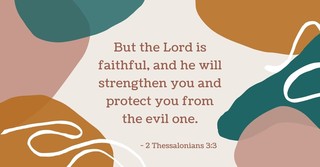
- Recent Translations
- All Translations
Tièsāluóníjiāhòushū 3:8
Share
Settings
Tièsāluóníjiāhòushū 3:8 Meaning and Commentary
Neither did we eat any man's bread for nought
&c.] Or freely, at free cost, without paying for it; he signifies, that what they ate, they bought with their own money, and lived on no man, without giving him a valuable consideration for what they had; though if they had not paid in money for their food, they would not have ate it for nought, since they laboured among them in preaching the Gospel to them; and such labourers are worthy of their maintenance, ( Luke 10:7 ) though the former sense is the apostle's here:
but wrought with labour and travail night and day:
not only laboriously preaching the Gospel to them, as often as they could have opportunity, but working very hard and incessantly with their hands, at the occupations and trades they had been brought up to; and that of the Apostle Paul's was a tentmaker, at which he sometimes wrought, thereby ministering to his own, and the necessities of others, ( Acts 18:3 ) ( 20:34 ) , nor was this inconsistent with his learning and liberal education. It was usual with the Jewish doctors to learn a trade, or follow some business and calling of life; (See Gill on Mark 6:3). The apostle's end in this was,
that we might not be chargeable to any of you;
or burdensome to them, they being for the most part poor; and the apostles being able partly by their own hand labour, and partly by what they received from Philippi, ( Philippians 4:16 ) to support themselves, chose to that they might not lie heavy upon them, and any ways hinder the spread of the Gospel among them, at its first coming to them. And so Maimonides says the ancient Jewish doctors behaved, and with a like view: wherefore, says he F16,
``if a man is a wise man, and an honourable man, and poor, let him employ himself in some handicraft business, even though a mean one, and not distress men (or be burdensome to them); it is better to strip the skins of beasts that have been torn, than to say to the people, I am a considerable wise (or learned) man, I am a priest, take care of me, and maintain me; and so the wise men have ordered: and some of the greatest doctors have been hewers of wood, and carriers of timber, and drawers of water for the gardens, and have wrought in iron and coals, and have not required anything of the congregation; nor would they take anything of them, when they would have given to them.''
F16 Hilchot Mattanot Anayim, c. 10. sect. 18.
